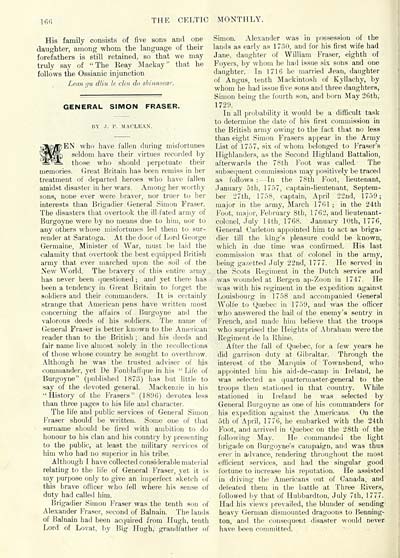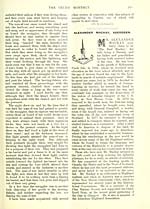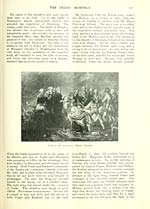Blair Collection > Celtic monthly > Volume 5, 1897
(240)
Download files
Complete book:
Individual page:
Thumbnail gallery: Grid view | List view

inn
THE CELTIC MONTHLY.
His family consists of five sons and one
daughter, among -whom the language of their
forefathers is still retained, so that we may
truly say of "The Reay Mackay" that he
follows the Ossianic injunction
Lean iju diiu le cliu du shinnsew.
GENERAL SIMON FRASER.
BY .1. P. MACLEAX.
j^^IREN who have fallen during misfortunes
^^h seldom have their virtues recorded by
Js^^ those who should perpetuate their
memories, (treat Britain has been remiss in her
treatment of departed heroes who have fallen
amidst disaster in her wars. Among her worthy
sons, none ever were braver, nor truer to her
interests than Brigadier General Simon Fraser.
The disasters that overtook the ill-fated ai-my of
Burgoyne were by no meaus due to him, nor to
any others whose misfortunes led them to sur-
render at Saratoga. At the door of Lord George
Germaiue, Minister of War, must be laid the
calamity that overtook the best equipped British
army that ever marched upon the soil of the
New World. The bravery of this entire army
has never been (juestioned ; and yet there has
been a tendency in Gi'eat Britain to forget the
soldiers and their commanders. It is certainly
strange that American pens have written most
(■(inceriiing the affairs of Hurgoyne and the
\al(inius deeds of his soldiers. The name of
General Fraser is better known to the American
reader than to the British; and his deeds and
fair name live almost solely in the recollections
of those whofse country he sought to overthrow.
Alth(jugh he was the trusted adviser of hjs
commander, yet De Fonblaffque in his " fjife of
Burgoyne" (published 1873) has but little to
say of the devoted general. Mackenzie in his
"History of the Erasers" (181)6) devotes le.ts
than three ]:iages to his life and character.
The life and public services of General Simon
Fraser should be written. Some one of that
surname should be fired with ambition to do
honour to his clan and his country by presenting
to the public, at least the military .servires of
him who had no superior in his tribe.
Although I have collected considerable material
relating to the life of General Fraser, yet it is
my purpose only to give an imperfect sketch of
this brave ofKcer who fell where his sen.se of
duty had called him.
Brigadier Simon Phaser was the tenth son of
Alexander Fraser, second of Balnaiu. The lauds
of ]5alnain had been acquired from Hugh, tenth
Lord of Lovat, liy Big Hugh, grandf.ather of
Simon. Alexander was in possession of the
lands as early as 1730, and for his first wife had
Jane, daughter of William Fraser, eighth of
Foyers, by whom he had issue six sons and one
daughter. In 1716 he married Jean, daughter
of Angus, tenth Mackintosh of Kyllachy, by
whom he had issue five sons and three daughters,
Simon being the fourth son, and born May 26th,
1720.
In all probability it would be a difficult task
to determine the date of his first commission in
the British army owing to the fact that no less
than eight Simon Frasers apiiear in the Army
List of 1757, six of whom belonged to Eraser's
Highlanders, as the Second Highland Battalion,
afterwards the 78th Foot was called. The
subsequent commissions may positively be traced
as follows : — In the 78th Foot, lieutenant,
January 5th, 1757, captain-lieutenant, Septem-
ber 27th, 1758, captain, April 22nd, 1759;
major in the army, March 17G1 ; in the 24th
Foot, major, February 8th, 1762, and lieutenant-
colonel, July Uth, 1768. January 10th, 1776,
General Carleton appointed him to act as briga-
dier till the king's pleasure could be known,
which in due time was confirmed. His last
commission was that of colonel in the army,
being ga/.etted July 22nd, 1777. He served in
the Scots Regiment in the Dutch service and
was wounded at Bergen ap-Zoon iu 1747. He
was with his regiment in the expedition against
Loui.sbourg in 1758 and accompanied General
Wolfe to Quebec in 1759, and was the officer
who answered the hail of the enemy's sentry in
French, and made him believe that the troops
who surprised the Heights of .Vbraham were the
Regiment de la Rhine.
After the fall of Quebec, for a few years he
did garrison duty at Gibraltar. Through the
interest of the Marquis of Townshend, who
appointed him his aid-de-camp in Ireland, he
was selected as quartermaster-general to the
troops then stationed in that countrj'. While
stationed in Ireland he was selected by
General Burgoyne as one of his commanders for
his expedition against the Americans. On the
5th of April, 1776, he embarked with the 24th
Foot, and arrived in (Quebec on the 28th of the
following May. He commanded the light
brigade on Burgoyne's campaign, and was thus
ever in ailvance, rendering throughout the most
efficient services, and had the singular good
foi tune to increase his reputation. He assisted
in driving the Americans out of Canada, and
defeated them in the battle at Three Rivers,
followed by that of Hubbardton, July 7th, 1777.
Had his views prevailed, the blunder of sending
heavy German dismounted dragoons to Benning-
ton, and the consequetit disaster would never
have been committed.
THE CELTIC MONTHLY.
His family consists of five sons and one
daughter, among -whom the language of their
forefathers is still retained, so that we may
truly say of "The Reay Mackay" that he
follows the Ossianic injunction
Lean iju diiu le cliu du shinnsew.
GENERAL SIMON FRASER.
BY .1. P. MACLEAX.
j^^IREN who have fallen during misfortunes
^^h seldom have their virtues recorded by
Js^^ those who should perpetuate their
memories, (treat Britain has been remiss in her
treatment of departed heroes who have fallen
amidst disaster in her wars. Among her worthy
sons, none ever were braver, nor truer to her
interests than Brigadier General Simon Fraser.
The disasters that overtook the ill-fated ai-my of
Burgoyne were by no meaus due to him, nor to
any others whose misfortunes led them to sur-
render at Saratoga. At the door of Lord George
Germaiue, Minister of War, must be laid the
calamity that overtook the best equipped British
army that ever marched upon the soil of the
New World. The bravery of this entire army
has never been (juestioned ; and yet there has
been a tendency in Gi'eat Britain to forget the
soldiers and their commanders. It is certainly
strange that American pens have written most
(■(inceriiing the affairs of Hurgoyne and the
\al(inius deeds of his soldiers. The name of
General Fraser is better known to the American
reader than to the British; and his deeds and
fair name live almost solely in the recollections
of those whofse country he sought to overthrow.
Alth(jugh he was the trusted adviser of hjs
commander, yet De Fonblaffque in his " fjife of
Burgoyne" (published 1873) has but little to
say of the devoted general. Mackenzie in his
"History of the Erasers" (181)6) devotes le.ts
than three ]:iages to his life and character.
The life and public services of General Simon
Fraser should be written. Some one of that
surname should be fired with ambition to do
honour to his clan and his country by presenting
to the public, at least the military .servires of
him who had no superior in his tribe.
Although I have collected considerable material
relating to the life of General Fraser, yet it is
my purpose only to give an imperfect sketch of
this brave ofKcer who fell where his sen.se of
duty had called him.
Brigadier Simon Phaser was the tenth son of
Alexander Fraser, second of Balnaiu. The lauds
of ]5alnain had been acquired from Hugh, tenth
Lord of Lovat, liy Big Hugh, grandf.ather of
Simon. Alexander was in possession of the
lands as early as 1730, and for his first wife had
Jane, daughter of William Fraser, eighth of
Foyers, by whom he had issue six sons and one
daughter. In 1716 he married Jean, daughter
of Angus, tenth Mackintosh of Kyllachy, by
whom he had issue five sons and three daughters,
Simon being the fourth son, and born May 26th,
1720.
In all probability it would be a difficult task
to determine the date of his first commission in
the British army owing to the fact that no less
than eight Simon Frasers apiiear in the Army
List of 1757, six of whom belonged to Eraser's
Highlanders, as the Second Highland Battalion,
afterwards the 78th Foot was called. The
subsequent commissions may positively be traced
as follows : — In the 78th Foot, lieutenant,
January 5th, 1757, captain-lieutenant, Septem-
ber 27th, 1758, captain, April 22nd, 1759;
major in the army, March 17G1 ; in the 24th
Foot, major, February 8th, 1762, and lieutenant-
colonel, July Uth, 1768. January 10th, 1776,
General Carleton appointed him to act as briga-
dier till the king's pleasure could be known,
which in due time was confirmed. His last
commission was that of colonel in the army,
being ga/.etted July 22nd, 1777. He served in
the Scots Regiment in the Dutch service and
was wounded at Bergen ap-Zoon iu 1747. He
was with his regiment in the expedition against
Loui.sbourg in 1758 and accompanied General
Wolfe to Quebec in 1759, and was the officer
who answered the hail of the enemy's sentry in
French, and made him believe that the troops
who surprised the Heights of .Vbraham were the
Regiment de la Rhine.
After the fall of Quebec, for a few years he
did garrison duty at Gibraltar. Through the
interest of the Marquis of Townshend, who
appointed him his aid-de-camp in Ireland, he
was selected as quartermaster-general to the
troops then stationed in that countrj'. While
stationed in Ireland he was selected by
General Burgoyne as one of his commanders for
his expedition against the Americans. On the
5th of April, 1776, he embarked with the 24th
Foot, and arrived in (Quebec on the 28th of the
following May. He commanded the light
brigade on Burgoyne's campaign, and was thus
ever in ailvance, rendering throughout the most
efficient services, and had the singular good
foi tune to increase his reputation. He assisted
in driving the Americans out of Canada, and
defeated them in the battle at Three Rivers,
followed by that of Hubbardton, July 7th, 1777.
Had his views prevailed, the blunder of sending
heavy German dismounted dragoons to Benning-
ton, and the consequetit disaster would never
have been committed.
Set display mode to: Large image | Transcription
Images and transcriptions on this page, including medium image downloads, may be used under the Creative Commons Attribution 4.0 International Licence unless otherwise stated. ![]()
| Early Gaelic Book Collections > Blair Collection > Celtic monthly > Volume 5, 1897 > (240) |
|---|
| Permanent URL | https://digital.nls.uk/75853634 |
|---|
| Shelfmark | Blair.57 |
|---|---|
| Additional NLS resources: | |
| Attribution and copyright: |
|
| Description | A selection of books from a collection of more than 500 titles, mostly on religious and literary topics. Also includes some material dealing with other Celtic languages and societies. Collection created towards the end of the 19th century by Lady Evelyn Stewart Murray. |
|---|
| Description | Selected items from five 'Special and Named Printed Collections'. Includes books in Gaelic and other Celtic languages, works about the Gaels, their languages, literature, culture and history. |
|---|

